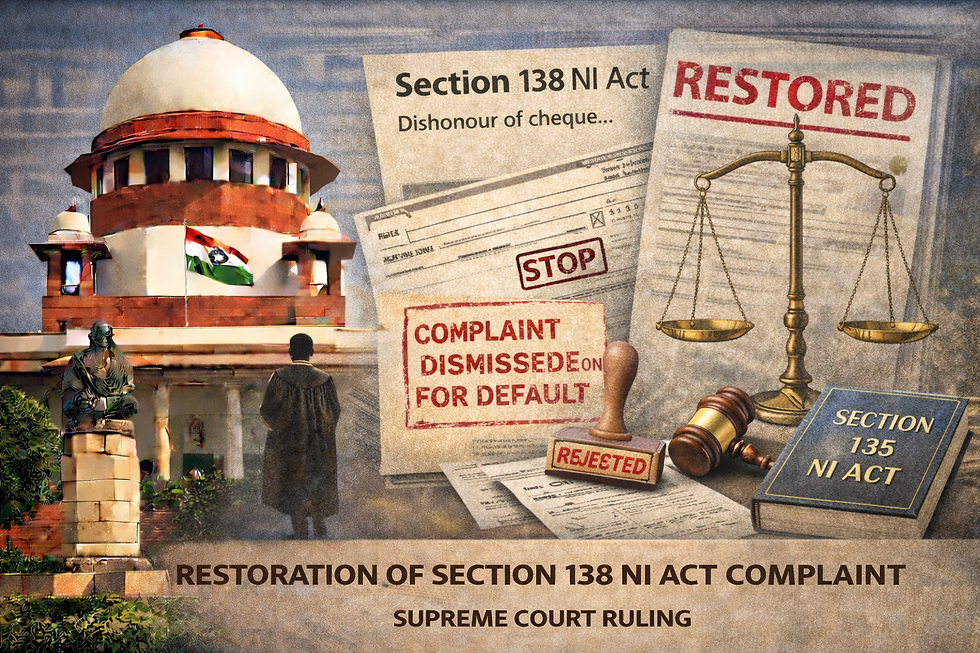A Just Balance Between Fundamental Rights and Police Powers – Supreme Court's Ruling on Multiple FIRs in Corruption Cases
- Chintan Shah

- Feb 20, 2025
- 4 min read
Summary of the Judgment
Case Name: State of Rajasthan v. Surendra Singh Rathore
Court: Supreme Court of India
Judgement Date: 19th February 2025
Coram: Hon’ble Justice Sanjay Karol, Hon’ble Justice Prashant Kumar Mishra
Appellant: State of Rajasthan
Respondent: Surendra Singh Rathore
Acts and Sections Involved:
Sections 7, 7A, 8, and 12 of the Prevention of Corruption (Amendment) Act, 2018
Section 120-B of the Indian Penal Code, 1860
Section 482 of the Criminal Procedure Code, 1973
Cited Judgements:
Babu Bhai v. State of Gujarat [(2010) 12 SCC 254]
T.T. Antony v. State of Kerala [(2001) 6 SCC 181]
Anju Chaudhary v. State of U.P. [(2013) 6 SCC 384]
Kari Choudhary v. Sita Devi [(2002) 1 SCC 714]
Upkar Singh v. Ved Prakash [(2004) 13 SCC 292]
Ram Lal Narang v. State (Delhi Admn.) [(1979) 2 SCC 322]
Surender Kaushik v. State of U.P. [(2013) 5 SCC 148]
P. Sreekumar v. State of Kerala [(2018) 4 SCC 579]
Background
The case arose from the quashing of FIR No. 131 of 2022 by the Rajasthan High Court, which had been registered against the respondent, Surendra Singh Rathore, a government official accused of corruption. The allegations stemmed from complaints that the respondent demanded bribes for granting bio-diesel pump licences. The High Court had quashed the FIR, citing the principle that a second FIR for the same offence was not maintainable. The State of Rajasthan challenged this decision in the Supreme Court.
Contentions of the Parties
Arguments of the Respondent
The second FIR did not disclose any fresh incident distinct from the first FIR.
If new information came to light, further investigation under Section 173(8) Cr.P.C. was the appropriate remedy rather than registering a fresh FIR.
Filing of a second FIR regarding connected allegations was irregular, violating the principle laid down in T.T. Antony v. State of Kerala.
The allegations in the second FIR merely expanded upon the first FIR rather than revealing a new offence.
No sanction was obtained under the Prevention of Corruption Act before proceeding against the respondent.
Arguments of the Appellant (State of Rajasthan)
The second FIR was not a mere repetition but related to a larger conspiracy involving corruption in granting bio-fuel licences.
The High Court erred in treating the FIRs as identical; instead, the second FIR pertained to a wider and more serious conspiracy.
The Supreme Court has, in past cases, allowed second FIRs when they reveal fresh facts, a broader conspiracy, or a different transaction.
Quashing the FIR prematurely would impede a crucial investigation into systemic corruption.
Supreme Court's Observations and Rationale
The Supreme Court undertook a detailed examination of the principles governing multiple FIRs, referring extensively to prior precedents. Key findings were:
Rule Against Multiple FIRs: The Court reiterated that multiple FIRs for the same offence are generally impermissible. However, there are exceptions when new facts, a broader conspiracy, or different incidents are involved.
Exceptions Permitting a Second FIR:
A second FIR is valid if it presents a counter-complaint or a rival version.
When the second FIR is based on fresh discovery of a larger conspiracy, it is maintainable (Nirmal Singh Kahlon v. State of Punjab).
If the new FIR is distinct in scope and consequences, it is not hit by the principle of sameness.
Application to Present Case:
The second FIR in this case was found to be broader in scope, detailing a pattern of corruption rather than just an isolated incident.
The allegations in the second FIR extended beyond those in the first FIR and included systemic corruption by the respondent.
The Court determined that allowing the second FIR would serve the public interest in tackling corruption.
Conclusion and Judgement
The Supreme Court held that the High Court erred in quashing the second FIR without adequately considering its broader scope. Quashing the FIR at this stage would prematurely terminate an investigation into potential large-scale corruption. The Court, therefore, reinstated the FIR and directed the Anti-Corruption Bureau to complete the investigation expeditiously under the supervision of the Director General of Police, Rajasthan.
Final Ruling:
The Rajasthan High Court's judgement quashing FIR No. 131 of 2022 was set aside.
The second FIR was reinstated and the investigation allowed to proceed.
The appeal by the State of Rajasthan was allowed.
Implications for Indian Legal Jurisprudence
Reaffirmation of the Doctrine of Sameness: The judgement reinforces the principle that multiple FIRs cannot be registered for the same offence but recognises exceptions.
Clarification on Scope of Second FIRs: The case provides clarity on situations where second FIRs are valid, especially in corruption cases involving evolving evidence.
Strengthening Anti-Corruption Investigations: By allowing the second FIR, the Court has bolstered investigative agencies' ability to probe widespread corruption without procedural hindrances.
Impact on Future Corruption Cases
This ruling serves as an important precedent for future corruption cases in India. By allowing second FIRs in cases where broader corruption is uncovered, the Supreme Court strengthens investigative mechanisms and ensures that complex bribery cases are not dismissed prematurely due to procedural technicalities. This judgement reinforces the legal framework for fighting systemic corruption and provides clarity on investigative processes in high-stakes cases.



Comments